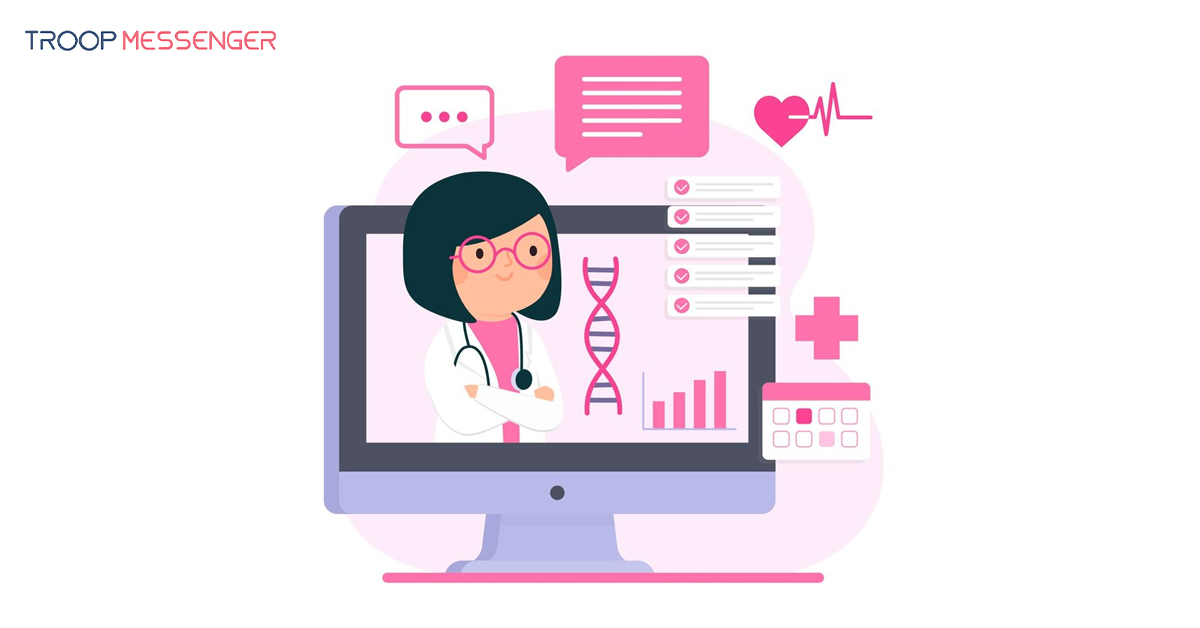Connect with us

Electronic Health Record Systems: How Customization Can Help?
Technologies in the healthcare industry continue to evolve and, in this hustle, simplifying tasks and enhancing patient care makes all the difference.
One of the systems that is being widely used by multitude of healthcare facilities from hospitals to private practitioners and dentists is Electronic Health Record software. Nowadays, there are lots of offerings from vendors across the globe that offer their SaaS solutions to fit any kind of medical care and size of an organization.
However, the question may arise when a brand new, modern EHR must be integrated into your complex system of existing software solutions that power all operations in your organization: from appointment management to telehealth or medical device software. Interoperability and data integrity may not be included in your SaaS subscription.
Let’s discover the power of efficient and HIPAA-compliant Electronic Health Record (EHR) systems in healthcare management and how custom development solves issues with its integration, customization, or even development in case off-the-shelf solutions don’t fit.
What Should I Know About the Electronic Health Record System?
An Electronic Health Record system is a mandatory tool in the healthcare sector. But what exactly are EHR systems, and what do they do?
Simply put, Electronic Health Record (EHR) systems are digital versions of patients' paper charts. These systems contain both important and sensitive information about patient's medical history, which includes but is not limited to:
- Treatments;
- Diagnoses;
- Medications;
- Allergies;
- Lab results.
An EHR system today is an essential repository of a patient’s health information that’s accessible at the touch of a button.
It’s accessible to the patients themselves as well so that they always have the most up-to-date information and can double-check lab results or prescriptions. Sometimes EHRs are also enriched with scheduling features, billing, and e-prescription tools.
Some solutions are working towards making it possible to share patient’s data to other healthcare facilities where they come to so that the doctors always have all available data to aid them in better decision making and not to waste time on repetitive tests. There’s a lot of discussions on how blockchain technology can help with this initiative while still keeping all the records secure.
Of course, first of all any EHR must be HIPAA-compliant and this dictates how certain features can or cannot be implemented.
What is the purpose of an EHR system for healthcare providers?
EHR systems have multiple purposes, but all of them are aimed at:
- Improving patient care,
- Enhancing efficiency,
- Ensuring accuracy in healthcare delivery.
Here’s a peek at what EHR systems are all about:
Centralized Patient Information: A desired result of an EHR development consolidates all aspects of a patient's health information into a single digital record. Gone are the days of rifling through stacks of paper charts; with EHR systems, healthcare providers have instant access to comprehensive patient data, right at their fingertips.
Improved Communication and Coordination: EHR systems facilitate effective communication and collaboration among healthcare providers, whether it's:
- Sharing test results
- Updating treatment plans
- Coordinating care across different departments
EHR systems make it easy for healthcare teams to stay on the same page.
Prioritization of Patient Safety: EHR systems are like guardians of patient safety, flagging potential medication errors, drug interactions, and allergies in real-time. Built-in safety checks and alerts in EHR systems help healthcare providers not only make informed decisions, but, what’s also very important, prevent adverse events.
Data Analysis for Better Care: Data is yet another benefit you, as a healthcare provider, get from utilizing an EHR system. Apart from offering you insights into patient populations, disease trends, and even treatment outcomes, healthcare organizations analyze EHR data to:
- Identify areas for improvement.
- Implement evidence-based practices.
- Deliver better care to patients.
Real-Life Examples
To put things into perspective, let's take a look at a couple of real-life scenarios where EHR systems make a difference:
Patient Comes in for a Check-Up: A patient walks into their doctor's office for a routine check-up. With an EHR system in place, the doctor can quickly pull up the patient's medical history, review past diagnoses and treatments, and make informed decisions about their current care plan—all without having to flip through pages of paper charts or asking the patient to remember some information from 5 years ago.
Emergency Room Visit: In the fast-paced environment of the emergency room, every second counts, especially when a patient arrives with a life-threatening condition. Healthcare providers access critical information from the patient's EHR in seconds to provide life-saving treatment.
Moving: Changing the place of your permanent residence is a common thing. Imagine moving to another city, state, or even country! Ideally, with EHR systems and healthcare providers and software vendors working towards solutions’ transparency, interoperability, and accessibility, you don’t necessarily lose all your healthcare data. But of course, this is a topic for a big discussion nowadays, as security issues arise. No doubt a perfect solution is yet to be found.
How Custom Software Development rocks EHR systems?
Custom healthcare software development is more about solutions that are tailored to your unique needs as a healthcare provider rather than just opting for a basic software that can lack features important to you. Unlike off-the-shelf solutions, custom software is designed to sync seamlessly with the workflows and goals of each particular healthcare organization.
This individualized approach means that every aspect of the software meets your specific requirements. When you connect with a tech company, you have several discussions about how your organization operates, what are the workflows, what are the bottlenecks and areas for improvement, what difficulties your patients and employees have with the current solution. Based on this thorough review of your current situation a list of requirements is set up.
Next step is discussing what are the options to get to your desired point B: the fastest way, the most cost-efficient, the most forward looking, or a combination of them.
Having all of that outlined and agreed upon allows you to create a digital solution that actually brings value to you as the business owner and to everyone who deals with your website, app, or desktop software. As a result, operational efficiency improves and better patient outcomes are delivered.
Taking on the Challenges of EHR Development
One area where custom healthcare software development truly shines is in the development of Electronic Health Record (EHR) systems. EHR development throws some challenges your way. Some challenges to mention are handling the complexity of healthcare data or the necessity to integrate with existing systems and ensuring data interoperability.
Custom solutions swoop in to save the day by offering:
Tailored Solutions: Custom EHR development ensures that healthcare organizations have access to solutions that fit like a glove. You can be sure that the specifics of your business will be factored in. If you run a dental clinic, some of the specific features can be integrated with 3D imaging software, periodontal charting, and implant tracking. Pediatric EHRs usually have family data forms, growth and development charting, prenatal and newborn screening data, and even a child abuse reporting system.
Surgery facilities, labs, rehabs, nursing homes – they all have different needs. Crafting custom products allows those needs to be seen and be brought into reality.
Whether it's integrating with existing systems or cooking up custom features, custom software ensures that every aspect of the EHR is perfectly tailored to the organization's unique needs.
Efficiency: Custom EHR systems automate tasks effectively to free up precious time to focus on what matters most – patient care.
Enhanced Patient Experience: Custom EHR systems are all about putting the patient first. With features like patient portals and mobile apps, patients can access their health records with ease, communicate with their healthcare team, and take charge of their health journey like never before.
Choosing Your Healthcare Software Development Squad
Embarking on a custom healthcare software development journey? You'll want to pick the right team for the job, so here's what to look for:
Experience: Find a development squad with a knack for custom healthcare software development. They should know the ins and outs of the healthcare industry like the back of their hand.
Portfolio Quality: Take a closer look at the healthcare software development team’s portfolio and contact with their past clients. You need to make sure that the team has a solid track record in the healthcare industry as it’s a surefire sign of expertise and reliability.
Communication Skills: Communication is key – look for a squad that listens to your needs and keeps you in the loop every step of the way. Ask them what tools they use for transparent project management, billing and reporting.
Compliance Expertise: HIPAA compliance is no joke. Make sure your squad knows their stuff when it comes to implementing security measures and privacy controls. Protecting sensitive healthcare data is non-negotiable.
In a Nutshell
Custom healthcare software development, especially when it comes to EHR development, is a game-changer for healthcare providers. if you're ready to take your healthcare game to the next level, teaming up with the right squad for custom healthcare software development is the way to go.





.png)


